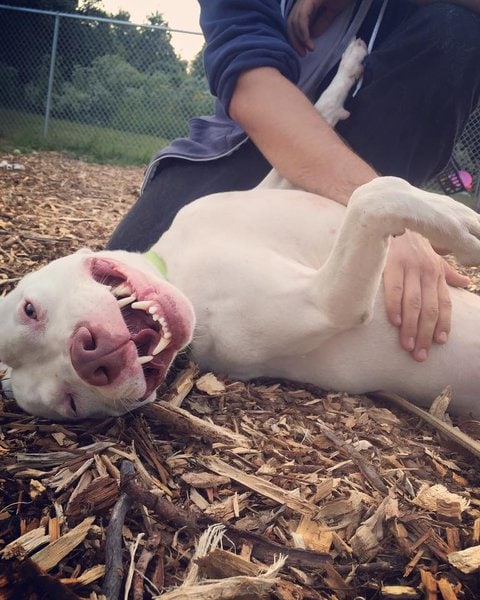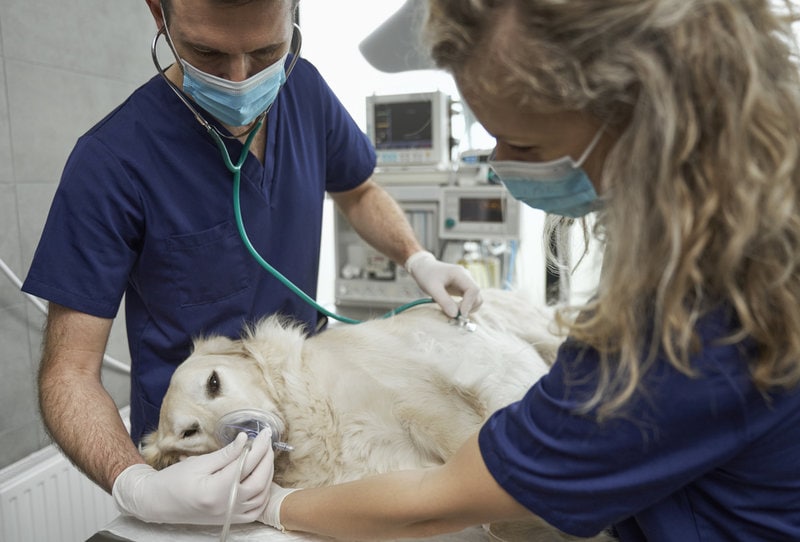It’s no secret that dogs, like humans, are prone to several health problems. But what if your pup shows concerning symptoms, like heavy breathing, a high temperature, or a high heart rate that indicate heart issues or even a heart attack? You may wonder, can dogs have a heart attack?
Yes, dogs can have heart attacks. Our fluffy friends are susceptible to heart diseases that can cause death if not treated quickly and correctly. Many dog owners are unaware of the symptoms of a heart attack in their furry companions, which can lead to tragedy.
This article discusses the signs and symptoms of heart attacks in dogs and how to prevent them from happening in the first place. We also review treatments for dog heart problems and other conditions that increase the likelihood of such problems. First, let’s have a look at the causes of heart attacks.
Can Dogs Have Sudden Heart Attacks?

Yes, dogs have heart attacks and such attacks can happen suddenly.
It is important for a pet owner to be aware of your dog’s potential health risks. Heart attacks are more likely in dogs aged seven and older, but they can occur in dogs of any age.
While most people are familiar with human symptoms of a heart attack, they may not be aware dogs can also suffer from this condition. So many dog owners may not know how to recognize the symptoms.
Fortunately, many doggie heart problems are treatable. The sooner your dog receives treatment, the better their chances of recovery. We’ll review some general warning signs that all dog owners should be aware of.
What Are The Causes Of Heart Attacks In Dogs?
The potential causes of heart attacks in dogs include genetics, lifestyle, and underlying health conditions. The most common cause is atherosclerosis, which can block blood flow and oxygen from reaching the heart, causing a heart attack.
Other causes include high blood pressure, diabetes, congestive heart failure, and cancer. As with humans, dog heart attacks occur when the blood flow to the heart muscle is blocked, resulting in tissue damage or death.
Several factors can lead to heart attacks in dogs:
- Coronary artery disease caused by plaque buildup in the arteries
- Heart disease caused by aging or other factors
- Obesity is a significant risk factor for heart disease in dogs
- High-fat and high-cholesterol diets
- Lack of exercise increases the risk for obesity and heart disease
- Stress can also lead to high blood pressure and heart attacks
The good news is there are things that you can do to help prevent a heart attack in your dog. Make sure that your dog gets regular exercise and maintains a healthy weight. Talk to your veterinarian about heart health screenings and what you can do to keep your dog’s heart healthy. Heart attacks can be fatal if not treated promptly.
Why Do Dogs Get Heart Attacks?
Long-term health conditions can increase dogs’ risk of heart attacks. Some of the most common chronic health problems leading to increased risk of heart disease include diabetes, high blood pressure, and heartworm disease.
Typical long-term health conditions that affect dogs’ heart health include:
Valvular Disease
With this condition, the heart’s valves become damaged or diseased. When this happens, the heart must work harder to pump blood through the body, eventually leading to heart failure.
Valvular disease is most common in small breeds of dogs, such as Poodles and Yorkies. However, it can also occur in Labradors and Golden Retrievers.
Treatment
The goal of treatment is to reduce the risk of valve rupture and improve the quality of life for your dog. Surgery is often recommended for dogs with valvular disease, especially in severe conditions.
In some cases, vets prescribe medications to help manage symptoms of valvular disease and prevent the condition’s progression.

Cardiomyopathy
Another long-term health condition that can increase the risk of heart attacks is cardiomyopathy. With this condition, the heart muscle becomes weakened or damaged. When this happens, the heart cannot pump blood efficiently, leading to heart failure.
Cardiomyopathy is most commonly seen in Great Danes and Newfoundlands. However, it can also occur in smaller dog breeds, such as Chihuahuas and Pomeranians.
Treatment
There is no specific cure for cardiomyopathy in dogs, but many treatments are available to help manage the condition and improve your dog’s quality of life.
The most crucial treatment includes long-term medications to help manage heart failure symptoms, such as diuretics to reduce fluid retention and ACE inhibitors to help improve blood flow.
If the cause of the condition is known, treating the underlying condition may improve cardiomyopathy. For example, if cardiomyopathy is caused by tachycardia, treatment to control the heart rate may improve cardiomyopathy.
In some cases, pacemakers or other implantable devices may be recommended to help regulate the heart’s rhythm. Unfortunately, surgery is necessary in severe cases of cardiomyopathy.
What Are The Symptoms Of A Dog Having A Heart Attack?

The consequences can be severe if you don’t recognize the symptoms and get your dog to the vet in time. If untreated, your furry friends could eventually die.
Heart attacks are a medical emergency, so it’s crucial to recognize the signs and get your dog to the vet as soon as possible. If your normally active dog suddenly seems lethargic or disinterested in playing, it could be a sign that something is wrong.
Other behavioral changes to look out for are excessive panting, pacing or restlessness, or a change in appetite.
If you’re unfamiliar with the signs of a heart attack and don’t take your dog to the vet in time, they may suffer irreparable damage to its heart muscle.
Be proactive and take your dog to the vet at the first sign of unusual behavior. Only a professional can properly diagnose and treat a heart attack, so don’t delay getting your furry friend the help they need.
How Do I Know If My Dog Is Having A Heart Attack?
Rapid or abnormal heartbeat, losing consciousness, or trouble breathing can be signs your dog is having a heart attack. Your furry friend is like a part of the family. So it’s natural to want all the signs of a heart attack.
Check to see if your dog is panting excessively or has developed a sudden cough. These can both be signs of trouble breathing and a heart attack.
Next, take a look at your dog’s gums. Pale or blue gums could be another sign of trouble breathing and potentially a heart attack.
Finally, check for sudden changes in your dog’s energy or activity level. If your normally active dog is suddenly lazy or uninterested in playing, this could be a sign that something is wrong.
Look for additional symptoms of heart problems in your dog:
- Collapsing
- Loss of consciousness
- Weakness
- Paralysis
- Abnormal heartbeat
- Difficulty walking
- Swelling in the abdomen
What Do You Do When A Dog Has A Heart Attack?

It’s essential to act quickly and seek emergency veterinary care. If you think your dog is having a heart attack, try to keep your dog calm and comfortable. If possible, have your doggie lie down on its side in a quiet, relaxed environment.
While you’re waiting for help to arrive, there are a few things you can do to assist your canine buddy:
- Call your veterinarian immediately.
- Take your dog to the nearest animal hospital or emergency veterinary clinic.
- Begin CPR if your dog is not breathing and has no heartbeat.
- Administer oxygen to your dog if possible.
- Give your dog medication if prescribed by your veterinarian.
- Monitor your dog’s progress and vital signs closely.
- Take your dog back to the veterinarian for follow-up care.
After suffering a heart attack, a dog’s prognosis varies depending on the underlying cause, severity of the attack, and how quickly treatment was initiated.
With prompt and aggressive treatment, many dogs make a full recovery. Some dogs, however, may have long-term effects from heart attacks such as heart failure or arrhythmias.
How Do You Prevent A Heart Attack In A Dog?
There are a few precautions to take to prevent a heart attack in your dog. First, make sure they get plenty of exercise. Second, feed them a healthy diet low in fat and cholesterol. Finally, help them stay calm and relaxed by providing lots of love and attention.
Fortunately, you can do plenty to help your dog avoid a heart attack. Here are a few tips:
Feed Them A Healthy Diet
Ensure your dog eats a nutritious diet appropriate for its age, breed, and activity level. It is essential to provide a healthy low-fat diet to your dog. When choosing a low-fat diet for your dog, select a complete and balanced food so your pet gets all the nutrients they need.
Make sure your dog’s food is high in protein and low in fat, such as boiled chicken or fish. Avoid food high in sugar or carbs. Ensure your dog’s food is easy to digest and doesn’t contain artificial ingredients.

Provide Plenty Exercise
Exercise is vital for all dogs but essential for overweight or obese dogs. Exercise not only helps keep your dog physically fit but can also improve their mental well-being and help them stay calm and relaxed.
It’s important to start slowly and build up activity gradually, especially if your dog is not used to exercising. Take your furry friend for regular walks, runs, swims, or visits to the dog park lasting at least 30 minutes. And make sure they have plenty of toys to keep them active when indoors.
Take Them To The Vet Regularly
Taking your dog to the vet for a regular checkup on a quarterly basis is essential.
The vet can provide necessary vaccinations that will help keep your dog healthy and protect them from potentially deadly diseases. Vets also provide routine checkups to ensure your dog is healthy and identify potential health problems early.
Additionally, your vet can give you essential advice on caring for your dog and keeping them healthy. That way, you can get a healthy diet and exercise plan that’s safe and effective for your dog.
Following these tips can help your dog maintain a healthy weight and avoid the health problems that lead to heart attacks!
How Long Can A Dog Live After A Heart Attack?
Most dogs with heart attacks will die within a few hours or days. However, some dogs may be able to survive for a few weeks or even months after a heart attack.
The prognosis for dogs with a heart attack is usually poor, as the damage to the heart muscle is often irreversible. The length of time a dog can live after a heart attack depends on the severity of the attack, the underlying cause of the heart disease, the dog’s overall health, and even the dog breed.
What Dog Breeds Are Prone To Heart Attacks?
Unfortunately, some dog breeds are more prone to this problem than others. So, which dog breeds are most at risk for heart attacks? Here are some of the most vulnerable breeds, according to veterinarians.

Dachshunds
Dachshunds are a popular dog breed, but they’re also very susceptible to heart attacks. It is because they’re prone to cardiomyopathy. Dilated cardiomyopathy causes the heart muscle to weaken and stretch, which leads to an enlarged heart. It can eventually lead to heart failure and, in some cases, sudden death.
Cocker Spaniels
Cocker Spaniels are another breed that’s at risk for heart attacks. It is because they’re prone to a condition called mitral valve disease. Mitral valve disease occurs when the valve that separates the heart’s left chamber from the rest doesn’t function properly. It can cause blood to back up in the heart, eventually leading to heart failure.
Boxers
Boxers are another breed that’s prone to heart attacks. They’re susceptible to arrhythmogenic right ventricular cardiomyopathy (ARVC). ARVC is a heart condition that causes the muscle in the heart’s right ventricle to thin and stretch. It can lead to an irregular heartbeat and, eventually, heart failure.
Newfoundlands
Newfoundlands are susceptible to subvalvular aortic stenosis (SAS), making them prone to heart attacks. SAS narrows the valve that separates the left ventricle from the rest of the heart. It can cause the heart to work harder, eventually leading to heart failure.





